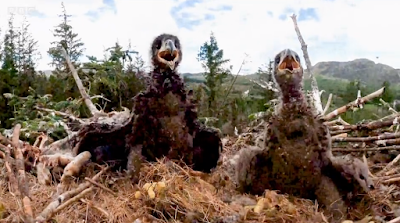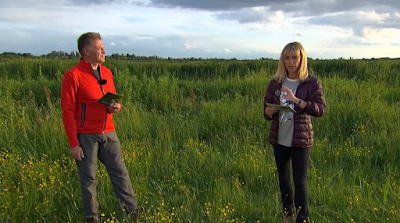08:00 This morning as we go into the shower, Lois and I start to hear the wonderful sound of rain falling outside and a chill in the air, after weeks of almost exclusively dry, warm weather. This is how things should be haha! All's right with the world if it's raining and cold outside and we're keeping the windows closed again.
And best of all, we won't have to water the garden tonight - hurrah !
It rains literally all day today. Later, from the living-room, through the closed window I take a picture of the garden looking the way it should, with all "the sweetness of the wet garden" haha!
(copyright Eleanor Farjeon, and thanks for all the memories of Sunday School and School Assemblies long long ago haha!)
11:00 We take the car out for a spin - we haven't used it since Thursday last week. We are currently only using petrol at the rate of about 16 gallons a year, or about 73 litres, so we're not making any oil companies rich at the moment, that's for sure.
11:30 We come home and have a cup of coffee on the sofa. I look at my smartphone. I'm pleased to see one of my favourite pundits, Benjamin Karimi of Manitoba University (crazy name, crazy guy), has been weighing in on the quora forum on the subject of the vexed question of whether humanity has ever come close to extinction. I've often wondered that myself - it must surely have been touch and go at at least one point or other!
Benjamin refers to a recent theory that the most recent evolutionary bottleneck occurred 70,000 years
ago, possibly because of a super volcanic eruption, at the site of present-day
Lake Toba in Sumatra, Indonesia; this is said to have been thought to have caused a major environmental change, reducing
human population to 10–30 thousand.
He also supplies a rather scary graphic comparing famous volcanic eruptions.
Benjamin warns us, however, that the alleged environmental cause for population decline after the Toba eruption, as well as the postulated genetic bottleneck itself, both remain controversial, and unproven.
And a 2011 study states that the extent of the climate change from the eruption could not possibly have been as great as the Toba theory proponents propose, “In addition, coalescence times for Y-chromosomal and mitochondrial DNA have been revised to
well above 100,000 years. And such coalescence would not, in itself,
indicate a population bottleneck either, because mitochondrial DNA and Y-chromosome
DNA are only a small part of the entire genome, and are atypical, in that they
are inherited exclusively through the mother or through the father,
respectively.”
That said, anthropological and genetic studies suggest that human population might have dropped to less than 2,000 in sub-Saharan
Africa before growing again in the Stone Age, allowing human population to take
over different continents.
In another interesting study, it is suggested that
native-American population are all descendants of 70 or so common ancestors.
Thank goodness we've got people like Benjamin keeping their finger on the pulse in these complex areas of research, that's for sure!
[??? - Ed]
16:00 Lois and I sit down on the couch with a cup of tea and a piece of jam and bread. We listen to the radio, an interesting programme called "Last Word". We try and catch this programme every Friday afternoon to see if anybody has died this week or not. Usually there are a few, about 4 or so, so not too bad!
The Maltese-born philosopher Edward de Bono has died, sadly, aged 88. He is well known for inventing the concept of "lateral thinking" - thinking "outside the box" in an effort to find a solution.
It was once put to him that "lateral thinking" was just a new label for creative thinking. He denied this, saying there was a very big difference between the two. Creative people were often extraordinarily rigid, he said. Artists were concerned most of all to getting their audience to see the world the way they saw it - they were often totally unable to escape from their usual outlook.
He also thought that the world's businessmen were much more highly motivated to improve their ways of thinking than were any other sections of society. He said he'd had groups of businessmen with combined salaries of over 10 million dollars meeting on a Saturday morning for 3 hours to listen to somebody talking about "thinking". The chances of getting together a gathering of academics of equivalent calibre to spend their Saturday morning doing something like that would be absolutely nil, he said - my god!!!!
He also proposed that stocks of Marmite, famously made from yeast extract, to the Middle East could help to solve the Arab-Israeli conflict. Both sides tended to eat only unleavened bread, de Bono had noticed, and he thought that eating Marmite would enable their bodies to take in more zinc, which tends to make people calm and less aggressive. Sheer brilliance - what a pity that the idea was never taken up with any degree of seriousness!
Edward de Bono's brilliant idea to solve the Middle East conflict
- simples !!!
What a guy !!!!!
20:00 We watch a bit of TV, the final edition in this year's series of Springwatch, a series which reports on wildlife throughout the UK by means of a team of presenters and a network of hidden cameras.
An interesting item tonight on the white-tailed eagle, Britain's largest bird of prey with a wing span of up to 8 feet.
It has been a relatively rare bird in the UK, but now on the Isle of Mull in Scotland they've got 22 pairs. and what they call now a "self-limiting population". When the young male birds reach maturity, they fly away from the nest area to get themselves their own territory.
white-tailed eagle chicks on the Isle of Mull, Scotland
What the typical young male does, on maturity, is to find an older male and kill it. Then it takes over the old male's territory, and also steals its old female partner, while he's about it. Simples!
Would this perhaps be a solution to human overpopulation? I don't know, but I think we should be told, and in good time for me to go into hiding at least!
a typical adult white-tailed eagle
Lois has actually got a bit fed up with Springwatch, and I almost have to get her in a headlock to persuade her to let me watch it.
I know what she means. Springwatch is almost all about birds these days - you don't see many animals any more. Lois thinks the BBC is just trying to save money. It's really cheap to set up a hidden camera next to a bird's nest and monitor it automatically 24/7 because all the action is in the nest - you see the chicks looking cute and periodically you see one of the adults fly in with a dead mouse or something and pull it to pieces for the chicks to gobble up.
broadcasting from Norfolk, the programme's two main presenters
Chris Packham and Michaela Strachan..
...and here you see just 9 of the dozens of birds' nests the programme
is monitoring - what madness !!!
What a crazy world we live in !!!!!
22:00 We go to bed - zzzzzzzzzz!!!












No comments:
Post a Comment